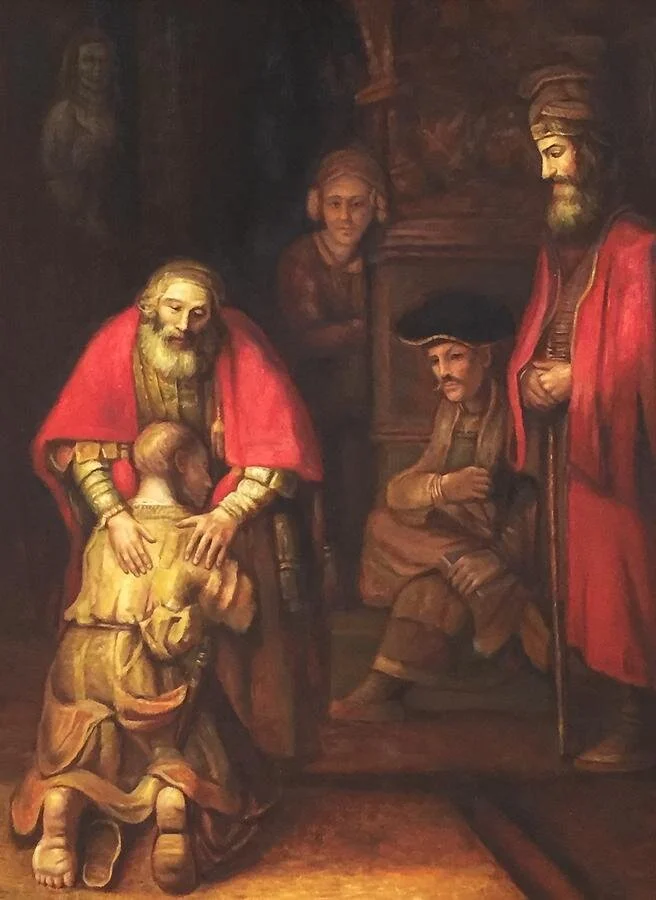You are adopted ! - Reflections on the Parable of the Prodigal Son
“You’re adopted!” is something that siblings might say to each other when they are having a childish fight. There is some truth to this sentiment, though- we are adopted children of God! Understanding this beautiful gift of sonship can really help us understand our identity in Christ and encourage us to live it fully.
“14 For as many as are led by the Spirit of God, they are the sons of God. 15 For ye have not received the spirit of bondage again to fear; but ye have received the Spirit of adoption, whereby we cry, Abba, Father. 16 The Spirit itself beareth witness with our spirit, that we are the children of God: 17 And if children, then heirs; heirs of God, and joint-heirs with Christ; if so be that we suffer with him, that we may be also glorified together. ”
We are adopted in baptism, “For because of the multitude of Your compassions, You have made us all worthy of sonship through holy Baptism,” (Fraction of the Liturgy of St Gregory). This is made possible by the Incarnation of our Lord. When we were baptised we ‘put on Christ’ (see Gal 3:27) so that when the Father looks at us He now sees Christ and call us, too, His sons:
“And so in like manner, the Father calls them sons in whomsoever He sees His own Son. ”
In this way, in baptism we are bestowed with the great rank of sonship so that we are sons and daughters of God by identity. This is not an emotional relationship, rather, as expressed by Fr Matthew the Poor, “ Adoption is a divine gift that we acquire through our union with the Person of Christ, the Son of God. It is not a mere relationship governed by will or emotions.”
Simply put, in baptism we are united with our Lord Jesus Christ. Since He is the Son of God and we are united to Him, we too are sons of God, not by nature ( we are not going to start creating things, we are not omnipresent, omnipotent or timeless etc.) but through adoption.
Now what has this to do with the prodigal son? When we read the story of the prodigal son we see images of love, repentance, forgiveness and reconciliation. On a deeper level we understand that this parable is about our adoption. How ?
Firstly, the two sons did nothing to be counted as sons of their father, they were born into it. This is the same with us; we did not do anything to become adopted children of God, our adoption is a fruit of the incarnation and we are born into it through the sacrament of baptism.
Secondly, the two sons have inherited all their father’s possessions and wealth. We, too, as adopted children of God, are inheritors of our heavenly Father, and joint heirs with the Son of God Himself (see Romans 8:17). As children of God our inheritance includes the Kingdom of Heaven and Eternal Life, which rightfully belong to God and are gifted to us.
Thirdly, when the prodigal son was at his lowest, eating swine food in the pigpen, he was still the son of his father. There is nothing that he could do to loose this identity. We, too, while in the depths of sin are still children of God, as this is our identity. We can choose to enjoy and live our identity in our Father’s house, or we can be wasteful of our inheritance and live in the pigpen contrary to our identity.
Remembering our identity reminds us of this great rank bestowed on us by God through His life-giving death and Resurrection. Our calling as Christians is to live out this identity through our participation in all aspects of the Christian life - by asceticism, fasting, prayer, service and living the complete life of The Church. What do we do when we leave our father's house and live in the pigpen? We remember our identity and return to our Father’s house where He is awaiting for us eagerly, running towards us, embracing us, and setting His table for the great feast. Each time we gather around the table of the Lord let us remember that He has once again accepted us as His sons, allowing us to share in His Life.
Jacob led out his sheep
And brought them to his father‘s home; A symbol for those with discernment, A parable for those with perception
Is to be found in this homecoming:
Let us too return to our Father‘s house, My brothers, and do not become captivated with desire
For this transient earth
—for your true city is in Eden.
Blessed indeed is that person
Who has seen his dear ones in its midst.
- St Ephrem the Syrian

